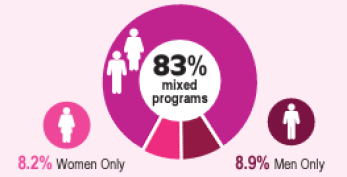

Applying interventions designed to reduce and manage the symptoms of substance use disorders.
Here you can find a collection of ISAM presentation recordings that took place during Lisbon Addictions 2022
Recording 1: An introduction to ISAM Global Expert Network (ISAM-GEN) – Hamed Ekhtiari
Recording 2: Development of a Global...
In ISAM-NIG's new monthly talk series "In Love with Addiction Neuroscience”, addiction neuroscientists from across the world share their personal stories/experiences on the beauty of addiction neuroscience and how/why they have decided to...
Here, you can find a series of webinar recordings put together by ISAM Neuroscience Interest Group in collaboration with ENIGMA Addiction Working Group.
Webinar 1: International Network on Neuroscience for Addiction Medicine
Webinar 2...
This guide highlights strategies for behavioural health and housing providers to conduct outreach and engage with individuals experiencing homelessness, initiate use of behavioural health treatment as they wait to receive stable housing and...
The fourth European Conference on Addictive Behaviours and Dependencies took place in Lisbon from 23-25 November 2022.
Under the overarching theme of Global Addictions, LxAddictions22 showcased cutting-edge research to help characterise...
The fourth European Conference on Addictive Behaviours and Dependencies took place in Lisbon from 23-25 November 2022.
Under the overarching theme of Global Addictions, LxAddictions22 showcased cutting-edge research to help characterise...
NAADAC's Assessment, Diagnosis, and Treatment of Co-occurring Disorders & SUD Specialty Online Training Series is designed for helping professionals who are dedicated to learning about co-occurring disorders in the field of addiction...
The VNGOC together with NYNGOC and the UNODC Civil Society Unit is organizing an online side event in the margins of the 2023 ECOSOC Partnership Forum on 31 January 2023 at 8.30 AM. The event is titled: The central role of civil society in...
This webinar was hosted by the HSE Health and Wellbeing Alcohol Programme as part of EU Alcohol Awareness Week.
The panel of speakers will discuss the statistics around alcohol use among adolescents and young people in Ireland and the...
World AIDS Day takes place in December each year. This reading list contains a list of research, publications and resources for practitioners relating to HIV/Aids. We also have a network dedicated to HIV and HCV where you can find a...
Integrating HIV-related care with treatment for substance use disorder provides an opportunity to better meet the needs of people living with these conditions. People with substance use disorder are rendered especially vulnerable by...
People with mental illness and/or SUD are disproportionally affected by HIV. They may participate in behaviours that increase risk for contracting and transmitting HIV, such as sharing injection drug equipment or...
Sharing needles, syringes, or other drug injection equipment—for example, cookers—puts people at risk for getting or transmitting HIV and other infections.
In addition to being at risk for HIV and viral hepatitis, people who inject drugs...
This summary page, developed by HIV info and NIH’s Office of AIDS Research, explores HIV and substance use.
The fact sheet addresses the following questions:
This side event for the 65th Commission on Narcotic Drugs was originally presented on 14 March, 2022. Organised by INPUD, it was co-sponsored by Médecins du Monde, UNAIDS, UNODC HIV/AIDS Section, the Netherlands and Australia.
In 2021...
The 2021-2026 Global AIDS Strategy has bold and critical new targets on realizing human rights, reducing stigma, discrimination and violence and removing harmful punitive laws as a pathway to ending inequalities and ultimately ending AIDS.
...A new publication by UNAIDS and the World Health Organization (WHO) emphasizes the importance of integrating HIV and mental health services and other interventions, including linkages to social protection services, for people living with...
Sharing drug injecting equipment increases the risk of transmitting and acquiring blood-borne infections, such as HIV and hepatitis B and C. While hepatitis C is the most prevalent blood-borne viral infection among people who inject drugs...
Share the Knowledge: ISSUP members can post in the Knowledge Share – Sign in or become a member